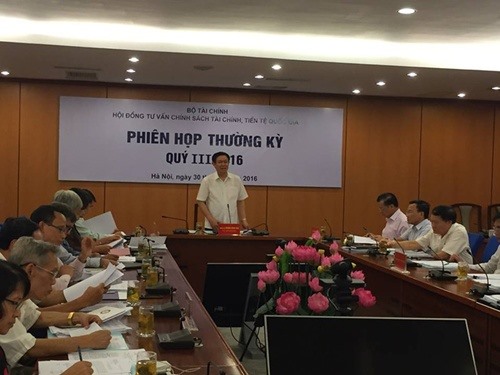Nation must improve economic competitiveness: think-tank
Deputy Prime Minister Vương Đình Huệ asked members of the National Financial and Monetary Policy Advisory Council to closely monitor the financial situation throughout the world, during their third-quarter meeting in Hà Nội yesterday.
The members agreed that it was necessary for Việt Nam to create a stable business and investment climate, renew its growth model and expand labour productivity.
Việt Nam has targeted its gross domestic product (GDP) to grow at 6.7 per cent, along with exports to grow at 6-7 per cent, next year.
Further, the consumer price index (CPI) is expected to rise by some 4 per cent, with total social investments accounting for some 31.5 per cent of GDP in 2017.
Deputy Minister of Planning and Investment Đào Quang Thu announced these figures after the country’s goal of reaching 6.7 per cent economic growth this year has proven largely unfulfilled.
There is, however, a strong possibility that the GDP will grow by 6.3 per cent and the CPI will rise by less than 5 per cent in 2016, he said, adding that total social investments have reached more than VNĐ1 quadrillion, or US$44.44 billion, during the first nine months of the year.
Thu said the slow recovery of the global economy is likely to impact on Việt Nam’s export growth next year, while uncertain global oil prices and risks of inflation caused by adjustments in domestic healthcare and education services are resulting in macro-economic imbalances.
Meanwhile, Nguyễn Thị Hồng, Deputy Governor of the State Bank of Việt Nam, said that inflation has “basically been stable”, although the central bank pumped a “relatively large” amount of money into the economy to support economic growth this year.
 |
| Deputy Prime Minister Vuong Dinh Hue speaks to members of the National Financial and Monetary Policy Advisory Council at a meeting on September 30 in Ha Noi. — Photo cafef.vn |
Hồng added that the central bank has steadied treasury bill and government bond issuances with foreign exchange buys to assure appropriate monetary operations. State bond issuances alone have amounted to VNĐ250 trillion this year, in line with national quotas.
She also said that a change in the central bank’s operations of exchange rates, with the reference rate now adjusted daily, has reduced foreign currency speculation and eased pressure that could cause interest rate hikes.
Overall, credit growth is likely to reach targeted levels of 18-20 per cent this year, she said.
Members of the council recommended that the Ministry of Planning of Investment build a set of criteria to assess the efficiency of investments more precisely. This will assure authorities have a clearer look about how to assist enterprises and foster economic growth.
Economist Trần Đình Thiên said although start-ups are now encouraged in national development schemes, new firms should not be established too hastily, because inventories and bad debt remain major issues that the country has to deal with.

